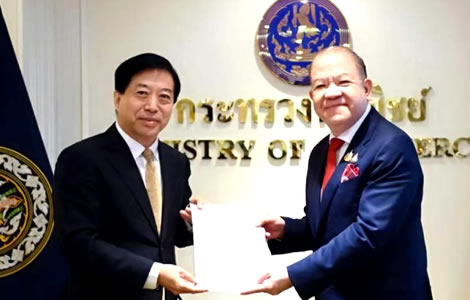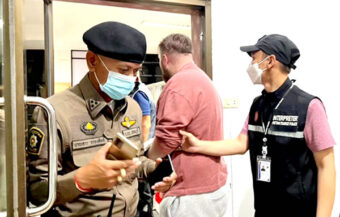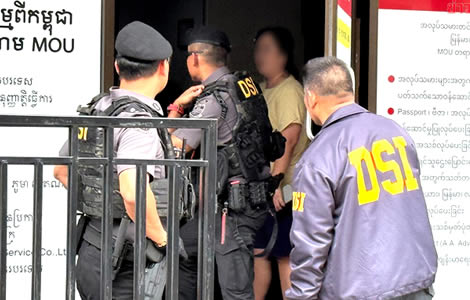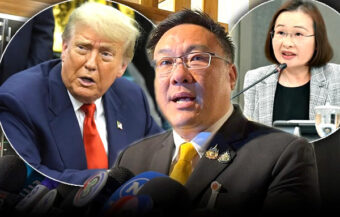Business leaders are alarmed at the government’s inaction on cheap Chinese imports, fearing a lack of commitment after a recent meeting between the Commerce Minister and the Chinese Ambassador. Thai manufacturing is shrinking and struggling to survive.
Business leaders fear the government lacks the mettle to follow through on promises made before the new government was formed regarding cheap Chinese goods being dumped on the Thai market. In particular, they are concerned about a recent tête-à-tête between the new Ministry of Commerce Pichai Naripthaphan and the Chinese Ambassador to Thailand, Mr. Han Zhiqiang. That meeting appears to sidetrack the pressing issue facing many small Thai firms, which is cutthroat competition from China across a growing list of sectors. Indeed, it is increasingly clear that Thailand’s trade and industry policy is out of touch with small, struggling private sector firms.

Thailand’s private sector and small business sector are raising concerns about the lack of government action in defending the country against cheaper Chinese imports.
Following an urgent meeting before the formation of the new government, former Minister of Commerce and Deputy Prime Minister Phumtham Wechayachai promised robust action.
In particular, he said that 28 government agencies would coordinate to deal with the problem. In this campaign, they were to implement five major measures and 63 minor measures to address the problem.
It comes as the Office of Industrial Economics (OIE) announced last week that manufacturers in Thailand will contract this year.
Director-General blames competition from China and highlights the devastating business debt issue
The Director-General of the body, Ms. Worawan Chitarun, explicitly blamed cutthroat competition from China. Indeed, this now threatens up to 30 different sectors of manufacturing and commercial activity in Thailand.
At the same time, government officials highlighted that business debt is another key impediment. The level of business sector debt presently stands at 87.6% of GDP, nearly as high as the country’s household debt level, which is 90.8% of GDP.
Nonetheless, industry leaders are both worried and aghast that no progress has been made in these initiatives, even after the new government has been in place for over a month. In truth, they are also concerned following a meeting between the new Minister of Commerce, Pichai Naripthaphan, and the Chinese ambassador to Thailand two weeks ago. At a meeting with Mr. Han Zhiqiang, a different agenda entirely was unfurled.
Meeting with Chinese envoy appeared to sidetrack urgent issues facing small Thai firms and action agreed upon
The meeting took place during a courtesy call on September 30th last. That was just over three weeks after Minister Pichai promised immediate action after taking up his post.
For instance, the Chinese envoy promised to help boost the export of Thai food products to China. Furthermore, he promised assistance to Thai firms trying to penetrate the Chinese market.
Business debt in Thailand is now nearly as high as household debt as manufacturing faces contraction
In addition, the Chinese ambassador talked about boosting Chinese investment in Thailand. However, to many small industry leaders and businessmen, this is a promise of even further and more powerful competition.
The talks between the Commerce Minister addressed the registration of giant Chinese online sellers in Thailand. This would be in addition to deals already negotiated between the government and massive Chinese sellers. Some of them such as mail order giant Alibaba are using Thailand as a base for distribution in Southeast Asia.
In short, such arrangements do not assist small and threatened Thai businesses.
Thai government officials address trade deficit concerns with China and on a macro level but not local impacts
In particular, the discussions between the Commerce Minister and the Chinese envoy talked about Thailand’s large trade deficit with China. Again, this does not particularly address the concerns of embattled Thai manufacturers and other commercial interests.
In the meantime, Thailand is becoming an offshore base for Chinese firms. The value of trade between Thailand and China in 2023 was $104.96 billion or ฿3.64 trillion. The trade deficit was $36.63 billion or ฿1.29 trillion.
Indeed, the latter figure was a record high. At the same time, Thailand imports high-value items from China, including electrical machinery, household electrical appliances, and computers.
Its most successful exports are fruit and cassava products. At the same time, many Chinese firms are establishing businesses or subsidiaries in Thailand, which may distort these figures.
Regulatory hurdles as Thai industry faces cut-throat competition from scaled and subisidised Chinese firms
Certainly, it means it makes it more difficult for Thai regulatory authorities to keep Chinese operators at arm’s length.
At the same time, the use of Thai firms and nominee shareholders or partners circumvent business protection laws. In particular the Foreign Business Act. At the same time Chinese firms benefit from state subsisides and large economies of scale.
In the meantime, Thailand’s industrial base is contracting, including its steel, car manufacturing, and transport sectors. The business community in Thailand ideally wants to see hefty tariffs on all Chinese goods.
This is the approach taken by Indonesian authorities who imposed tariffs on Chinese clothing recently. At the same time, Thai business interests wish to see laws to halt the establishment of Chinese subsidiaries here given the threat.
However, there is certainly a conflict between the government’s investment policies and the day-to-day fight for survival on the ground for existing Thai firms.
Government promises tighter controls but there is a disconnect between industrial base needs and its policies
While the government appears to demur in recent weeks in relation to tariffs, it did promise tighter controls including Thai Industrial Standards Institute (TISI) testing of imported goods.
Nonetheless, there appears to be a disconnect between the country’s trade and investment policies and the government’s ability to protect its home industrial base.
In short, it is clear that Thailand’s industrial base was not ready to compete with China. Trade agreements such as the Regional Comprehensive Economic Partnership (RCEP) and others have effectively spelt the death knell for the country’s manufacturing base.
In truth, it is out of date, over-borrowed, and finds itself at the wrong end of trade and market access laws agreed to by Thai governments over the last five years.
Join the Thai News forum, follow Thai Examiner on Facebook here
Receive all our stories as they come out on Telegram here
Follow Thai Examiner here
Further reading:
Business debt in Thailand is now nearly as high as household debt as manufacturing faces contraction
Economy faces a liquidity crisis as the property and manufacturing sectors nosedive impeding growth
New tax era in Thailand begins as Revenue now shares data with 138 countries within the OECD
Calls for clarification of new Tax regime which appears to target expat foreign income sources
10 year visa a magnet for global citizens setting up in Thailand with zero tax on offshore income
Wealthy foreigners to own small landholdings associated with homes here agreed in principle
New plan for the Thai economy could see an elite foreign visa scheme generate up to 6% of GDP
Economic plan to put the smile back in Thailand’s appeal to western foreigners to live and work
IMF urges government to loosen nation’s purse strings as finances tighten with the tax take down
Plan to allow high tech and skilled foreigners to live and work in Thailand for up to four years


















